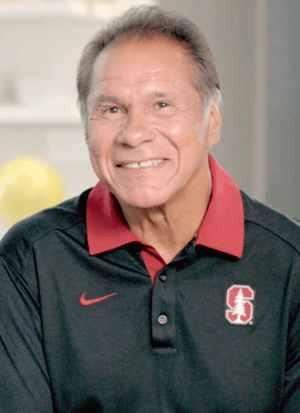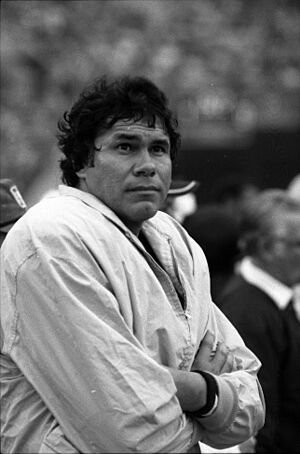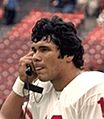Jim Plunkett facts for kids

Plunkett in 2018
|
|||||||||||||||||
| No. 16 | |||||||||||||||||
|---|---|---|---|---|---|---|---|---|---|---|---|---|---|---|---|---|---|
| Position: | Quarterback | ||||||||||||||||
| Personal information | |||||||||||||||||
| Born: | December 5, 1947 San Jose, California, U.S. |
||||||||||||||||
| Height: | 6 ft 3 in (1.91 m) | ||||||||||||||||
| Weight: | 220 lb (100 kg) | ||||||||||||||||
| Career information | |||||||||||||||||
| High school: | William C. Overfelt (San Jose, California) James Lick (San Jose, California) |
||||||||||||||||
| College: | Stanford (1968–1970) | ||||||||||||||||
| NFL Draft: | 1971 / Round: 1 / Pick: 1 | ||||||||||||||||
| Career history | |||||||||||||||||
|
|||||||||||||||||
| Career highlights and awards | |||||||||||||||||
|
|||||||||||||||||
| Career NFL statistics | |||||||||||||||||
|
|||||||||||||||||
| Player stats at PFR | |||||||||||||||||
|
College Football Hall of Fame
|
|||||||||||||||||
James "Jim" William Plunkett (born December 5, 1947) is a former American football quarterback. He played in the National Football League (NFL) for 16 seasons. Jim is best known for leading the Raiders team to two Super Bowl victories.
He played college football at Stanford University. There, he won the famous Heisman Trophy award in 1970. In 1971, the New England Patriots chose him as the very first player in the NFL draft. After playing for the Patriots and then the San Francisco 49ers, Jim joined the Oakland Raiders in 1978.
Jim started as a backup player for the Raiders. But in 1980, he became the main quarterback. He led the team to win Super Bowl XV, where he was named the game's MVP. Later, in 1983, he again stepped up to lead the Los Angeles Raiders to another win in Super Bowl XVIII. Jim Plunkett was inducted into the College Football Hall of Fame in 1990.
Contents
Jim Plunkett's Early Life
Jim Plunkett was born on December 5, 1947. His parents were Mexican-American. His father's side also had Irish and German family. Jim's father sold newspapers and slowly lost his eyesight. He had to support his wife, who was also blind, and their three children.
Jim's parents were both born in New Mexico. His mother, Carmen, was from Santa Fe. His father, William, was from Albuquerque. Carmen also had Native American family. Jim's father passed away in 1969.
Moving to California
The Plunkett family moved to California during World War II. Jim's father first worked in shipyards. Jim's two older sisters, Genevieve and Mary Ann, were born before Jim. Jim was born in 1947 after the family moved to Santa Clara.
They later moved to San Jose. There, Jim's father ran a newsstand. They found affordable housing in San Jose. The family was not rich and received some financial help. Jim and his sisters learned to work hard. They also helped their mother with chores.
Growing Up and School
Money was a big challenge for Jim when he was young. He did not like the area where he lived. He often did not have money for fun activities. He also avoided bringing friends to his house. Jim started working at a young age. He cleaned at a gas station in elementary school. He also delivered newspapers and bagged groceries. During summers, he worked in orchards.
Jim went to William C. Overfelt High School for two years. Then he moved to James Lick High School and graduated from there. Both schools are in San Jose, California. Jim showed his football talent early. At 14, he won a throwing contest. He threw a football over 60 yards!
In high school, he played quarterback and defensive end. He also played basketball, baseball, track, and wrestling. He even won a California High School Individual Wrestling Championship. Jim Plunkett is honored on the Hall of Fame wall at James Lick High School.
College Football Career
Jim Plunkett went to Stanford University. His first year was tough because he had a thyroid operation. This made him weaker. His coach, John Ralston, first thought about moving him to defensive end. But Jim really wanted to stay at quarterback. He practiced throwing 500 to 1,000 passes every day.
Becoming a Star Quarterback
In 1968, Jim got the chance to be the starting quarterback. In his first game, he played amazingly. He completed 10 of 13 passes for 277 yards. He also threw four touchdowns. He kept his starting spot after that game. Jim's arrival at Stanford changed college football. It brought in a new style of wide-open passing. This style is still popular today.
In his junior year, Jim set new records. He threw 20 touchdown passes. He also gained 2,673 passing yards. A coach from Washington State called him "The best college football player I've ever seen."
Winning the Heisman Trophy
In 1970, his senior year, Jim led Stanford to a conference championship. They also went to the Rose Bowl game for the first time since 1952. Stanford won the game 27–17 against the strong Ohio State Buckeyes.
Jim threw 18 passing touchdowns and ran for three more. He gained 2,715 passing yards that year. This broke his own record. For his amazing performance, Jim won the 1970 Heisman Trophy. He beat other great players like Joe Theismann and Archie Manning. Jim was the first Latino player to win the Heisman Trophy. He also won other awards, like the Maxwell Award.
Professional Football Career
Many people thought Jim Plunkett would be a great pro quarterback. He had a strong arm and was very accurate. These skills were perfect for pro teams that focused on passing.
Starting with the Patriots
In 1971, the New England Patriots chose Jim as the first player in the NFL draft. He was the first player of Hispanic heritage to be picked first in the NFL draft. The Patriots finished the 1971 season with 6 wins and 8 losses. Jim's first game was a 20–6 win against the Oakland Raiders. This was the Patriots' first game at their new stadium.
Jim also helped the Patriots affect the AFC East championship. He threw an 88-yard touchdown pass to his old Stanford teammate, Randy Vataha. This pass helped the Patriots beat the Baltimore Colts. Two weeks before that, Jim led the Patriots to a 34–13 win over the Miami Dolphins.
Jim continued to play well. In 1973, he was second in the NFL for passing yards. In 1974, he led the Patriots to a great start. They won 6 of their first 7 games. This was the team's first winning season in eight years. But in 1975, Jim hurt his left shoulder. This injury gave a new player, Steve Grogan, a chance to play. The Patriots' offense then focused more on running the ball.
Moving to the 49ers and Raiders
Before the 1976 NFL draft, Jim was traded to the San Francisco 49ers. He led the 49ers to a 6–1 start. But then the team struggled and finished with 8 wins and 6 losses. After a tough 1977 season, the 49ers released him in 1978.
Jim then joined the Oakland Raiders in 1978. For the next two years, he was a backup player. He didn't throw many passes. But five weeks into the 1980 season, things changed. The starting quarterback, Dan Pastorini, broke his leg. Jim, who was 32 years old, stepped in to play. In his first game as a starter, he completed 11 of 14 passes. He threw a touchdown and no interceptions.
Super Bowl Victories
Jim led the Raiders to nine wins in eleven games. They made it to the playoffs as a wild card team. Jim then led the Raiders to four playoff victories. This included the first-ever Super Bowl win by a wild card team. They beat the Philadelphia Eagles 27–10 in Super Bowl XV. Jim threw for 261 yards and three touchdowns. He was named the game's MVP. He was also the first minority quarterback to win a Super Bowl. He is the only Latino to be named Super Bowl MVP.
Later in his career, the Raiders moved to Los Angeles. In 1983, Jim became the starter again after Marc Wilson got injured. The Raiders went to Super Bowl XVIII. They defeated the Washington Redskins 38–9. Jim completed 16 of 25 passes for 172 yards and a touchdown in that game.
In 1984, Jim started the season as the Raiders' quarterback. But he suffered injuries to his stomach and hip. This made Marc Wilson the starter for the rest of the season. Jim started in the playoffs, but the Raiders lost. In 1985, Jim was injured again. In 1986, he shared the starting role with Wilson. He missed all of the 1987 season due to shoulder surgery. He retired in 1988.
Jim holds the Raiders' record for the longest pass in a career. It was a 99-yard pass play against the Washington Redskins in 1983. He is tied for the league record for this achievement. Jim is the only NFL quarterback to win two Super Bowls with the same team in different cities. He won his first when the Raiders were in Oakland. He won his second when they were in Los Angeles.
Images for kids
See also
 In Spanish: Jim Plunkett para niños
In Spanish: Jim Plunkett para niños
 | Ernest Everett Just |
 | Mary Jackson |
 | Emmett Chappelle |
 | Marie Maynard Daly |



